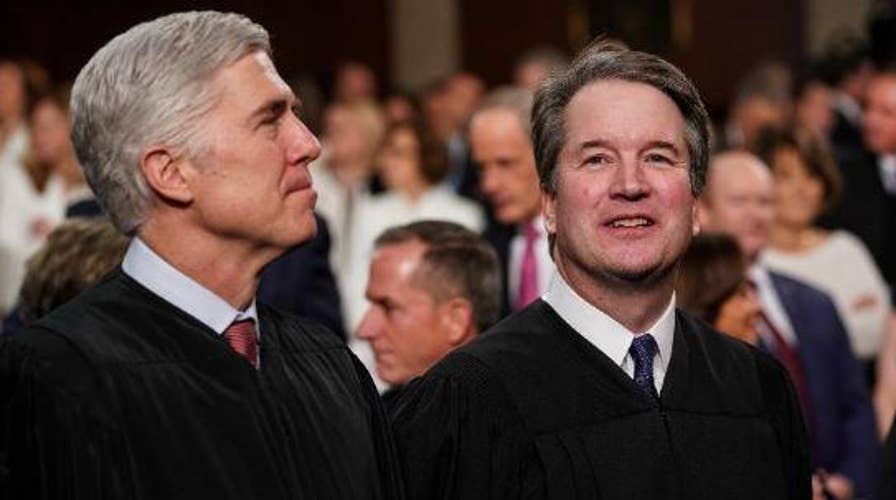Neil Gorsuch and Brett Kavanaugh find themselves on opposing sides in two out of three recent rulings
Neil Gorsuch and Brett Kavanaugh, President Trump’s two U.S. Supreme Court appointees, find themselves on opposing sides in two out of three recent rulings.
One of President Trump’s nominees sided Monday with the liberal wing of the Supreme Court for the second time in two weeks, as Justice Neil Gorsuch joined a narrow majority in support of a Native American man convicted for hunting in a national forest.
The case, Herrera v. Wyoming, deals with a treaty from 1868 which allowed members of the tribe to hunt in “unoccupied lands” in the U.S. in exchange for their land, which went on to become part of Wyoming and Montana. At issue was whether the hunting rights in the treaty are still in effect or were nullified when Wyoming became a state in 1890.
KAVANAUGH SIDES WITH LIBERAL JUSTICES AGAINST APPLE, DEALS BLOW TO TECH GIANT IN APP STORE CHALLENGE
The opinion by Justice Sonia Sotomayor – and joined by Ruth Bader Ginsburg, Elena Kagan, Stephen Breyer, and Gorsuch – ruled that the treaty indeed still applies, and that Crow member Clayvin Herrera was improperly convicted of off-season hunting in Bighorn National Forest in 2014.
The court’s 5-4 ruling, which vacated the decision from the state appellate court, is based on the 1999 decision in Minnesota v. Mille Lacs Band of Chippewa Indians. In that case, the Supreme Court said that a territory gaining statehood is not enough “to extinguish Indian treaty rights to hunt, fish, and gather on land within state boundaries.” The court went further in that case, stating that Congress “must clearly express” an intention to end a treaty with a Native American tribe in order for the treaty’s rights to expire.
By siding with the traditionally liberal justices, Gorsuch gave them a 5-4 majority in the case.
The opinion came exactly one week after Trump’s other nominee, Justice Brett Kavanaugh, sided with liberals in a 5-4 decision that he wrote, ruling that Apple could be sued by iPhone owners over high prices in their App Store.
Sotomayor, in the latest opinion, also addressed the argument that the land on which Hererra was hunting became “occupied” under the treaty when it became a national forest in 1897. The court’s decision said that while it is possible that certain areas of the forest could be considered occupied, the forest as a whole is not occupied by default simply because it is a national forest.
Hererra’s attorney, George W. Hicks, celebrated his client’s victory. “We are gratified that the Supreme Court held that the treaty hunting right guaranteed to the Crow Tribe and Mr. Herrera was not abrogated by Wyoming’s admission to the Union or the creation of the Bighorn National Forest,” he said in a statement to Fox News.
Gorsuch’s conservative colleagues, led by Justice Samuel Alito, argued in a dissenting opinion that the majority has it all wrong. Alito, like the lower court’s decision, relied on an 1896 case involving a similarly worded treaty between Wyoming and the Shoshonee and Bannack tribes, which also was from 1868. That case, Ward v. Race Horse, said that when Wyoming became a state, it ended the treaty. This ruling was based on the idea that states have the authority “to regulate the killing of game within their borders.”
Additionally, the conservative dissent said that a 1995 10th Circuit opinion in Crow Tribe of Indians v. Repsis dealt with the exact issue in Hererra’s case, relying on the precedent in Race Horse to say that the Crow Tribe’s hunting rights under their treaty expired when Wyoming became a state. Because the issue was already decided in that case, the dissent said, it was improper for it to be heard again here.
GORSUCH REPLACES BIDEN AS CHAIR OF CIVIC EDUCATION GROUP
The majority opinion addressed the Race Horse and Repsis cases, stating that the more recent 1999 Mille Lacs case renders them obsolete. Sotomayor also wrote that it did not matter that the same treaty had been addressed in the past, because the Mille Lacs case represented a "change in [the] applicable legal context." The conservatives disagreed.




